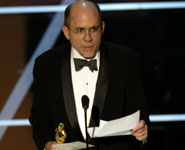
Unhappily holed-up in my apartment, absolutely covered in midterm storyboards, flashcards and analytical writings, it is safe to say I haven't seen a new movie lately. I am lucky enough, however, to be enrolled in a film analysis class, where I- get this- watch movies for homework. It's an excellent class, if only for the joy of understanding the true complexity of what goes into making a film. And I thought it might be interesting to name one or two people who don't get enough credit in this business.
Let's take a film I've been watching extensively for one of my midterms: the P.T. Anderson film, Magnolia. Most of the wonderful things I could say about this movie have already been said: a great ensemble cast, a positively stunning cinematic triumph, Tom Cruise is the man, two thumbs up, etc. etc.. And in my opinion, all these things are true (though I know many would disagree with me- this is a love-it-or-hate-it picture). But watching it now, I am stunned and impressed not by Tom Cruise, Philip Seymour Hoffman, or even P.T. Anderson.
It's Richard King who has my heart.
But who is King, you ask? He's the sound designer and supervising sound editor of Magnolia, a truly monumental task when you think about the ridiculous complexity of Magnolia's soundtrack. Each shot, especially in the beginning sequence played out under Aimee Mann's rendition of "One is the loneliest Number," has several layers of sound. One shot of Claudia in a bar has Mann's song, background noise, the sound of her jaw clicking, a voice-over from a TV commercial, and dialogue. In a nine second shot. All perfectly synchronized and constructed so that every layer is in harmony with the other, adding glorious, orchestrated dimension. Voice-over announcers, the sound of heavy breathing, and T.J. Mackey's strutting, profane sales pitch weave in and out of the opening sequence. The sound is only one aspect, of course, and it isn't necessarily the backbone of the film. But its seamless inclusion is matched with the acting, the setting, the cinematography- all the things that make the movie what it is. The melancholy sequence where all the principle characters sing along to "Wise Up," places the same importance on sound. Magnolia is about coincidence and commonality, and the music is many times the common thread that all the characters share. Whether you think it's beautiful or heavy-handed, you have to admit it's effective. And it's all thanks to Mr. King.
In the end I suppose it goes back to the idea of authorship of a film. To whom does Magnolia belong? The director? The writer? The production company? The first billed actor? Without any of these people the movie cannot be completed. So I think there really is no such thing as an "auteur"- an author or primary source. It works more, in my mind, much in the way a commune is supposed to. Yes, there is a leader of sorts, but without the staff as a whole, nothing gets done. In the end, whether a movie is good or bad cannot be put solely on one person. Its successes or shortfalls could be dependent on any number of people.
Like a sound designer.
(Photo of King courtesy of oscars.com)

No comments:
Post a Comment